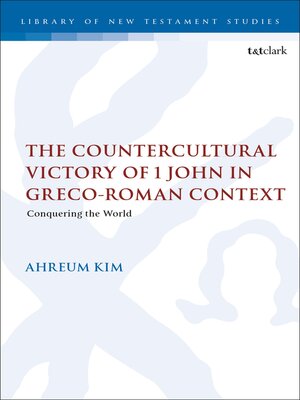The Countercultural Victory of 1 John in Greco-Roman Context
ebook ∣ Conquering the World · The Library of New Testament Studies
By Ahreum Kim

Sign up to save your library
With an OverDrive account, you can save your favorite libraries for at-a-glance information about availability. Find out more about OverDrive accounts.
Find this title in Libby, the library reading app by OverDrive.



Search for a digital library with this title
Title found at these libraries:
| Loading... |
Ahreum Kim re-examines conquering language in 1 John, arguing that when the letter is read with the context of Greco-Roman culture in mind, the conflict extends beyond in-fighting within the Johannine community. She suggests that the letter's author presents a consistent countercultural narrative due to concern about the predominant world, and proposes that the author exhorts the minority Johannine community to hold onto their belief while proclaiming that they are triumphant conquerors against the prevailing "world".
Kim first examines how conquering language toward a Johannine nike utilizes militaristic undertones already familiar in Greco-Roman culture. She argues that each of the opponents mentioned is affiliated with "the world", and it is ultimately the conquering of the world itself which marks the Johannine victory. Kim demonstrates that the author references the negative fear of the divine in the polytheistic world which contrasts with the Johannine love of God, and that his countercultural message continues to the very end, with a concluding warning against the many worldly idols. Finally, she posits that the battle with the Greco-Roman world is ultimately a conflict of pistis, comparing Roman soldiers achieving military victories with a pistis to their emperor, and the repeated emphasis on Jesus as the true Son of God.
Kim first examines how conquering language toward a Johannine nike utilizes militaristic undertones already familiar in Greco-Roman culture. She argues that each of the opponents mentioned is affiliated with "the world", and it is ultimately the conquering of the world itself which marks the Johannine victory. Kim demonstrates that the author references the negative fear of the divine in the polytheistic world which contrasts with the Johannine love of God, and that his countercultural message continues to the very end, with a concluding warning against the many worldly idols. Finally, she posits that the battle with the Greco-Roman world is ultimately a conflict of pistis, comparing Roman soldiers achieving military victories with a pistis to their emperor, and the repeated emphasis on Jesus as the true Son of God.






